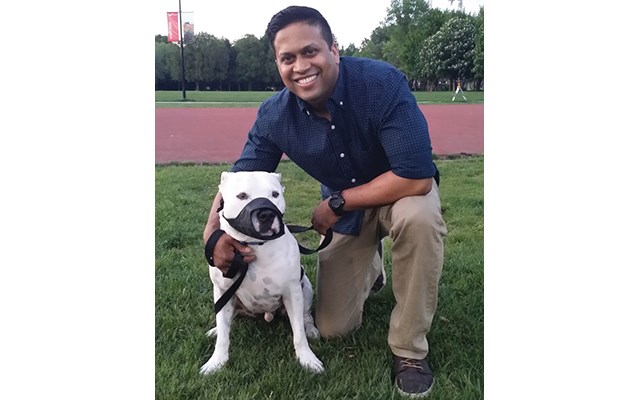Meet Prajeev De Silva and his five year-old terrier cross Sudhu.
By all accounts, Sudhu is a typical, friendly, slobbery neutered canine, but he holds a secret beneath his chin that seems at odds with his personality: a dangerous dog licence.
De Silva thinks it's wrong Sudhu can't shake the label that has been given to him since birth.
"I 100 per cent believe that my dog is being unfairly treated and that I am a victim of a cash grab by the city. I am also opposed to breedspecific bylaws or any other type of blanket law based on cherry-picked facts," said De Silva.
The Richmond resident acknowledges the debate on this issue has been a frequent and divisive one in Metro Vancouver over the years; more recently in Richmond, two Rottweilers involved in several, arguably minor, incidents were nearly destroyed until their owners fought for a legal settlement to spare their lives.
De Silva said he accepts the need for dangerous/aggressive dog bylaws. However, if the City of Richmond continues to implement breed-specific bylaws he said he would at least like to see a way for responsible owners to prove their dogs "innocent" - through a training program for both dog and master, on an individual basis - in order to clear the dog from the "dangerous" designation.
"I want to see some sort of procedure - like a certified document from a dog behaviourist, upon completion - and I don't mind paying for it," said De Silva.
De Silva also takes issue with what he believes are arbitrary rules on labelling dangerous dogs, something he feels happened to Sudhu, whose breed has never been proven, although he looks like a terrier.
According to city bylaws, pit bulls and Staffordshire terriers are considered "dangerous dogs." However, a dog will also qualify as a dangerous dog in Richmond if it has "the appearance and physical characteristics predominantly conforming to the standards for any of the above breeds."
Under bylaw, dangerous dogs are restricted to leashes and muzzles in all public places at all times. Also, they must not be under the care of a minor.
"When you have a muzzle on a dog, it perpetuates a stereotype that it's dangerous and shouldn't be part of society. I would like people to approach my dog so we can have a conversation about how not all of these dogs are dangerous," said De Silva, whose point was proven while speaking to the Richmond News at Minoru Arenas when White Rock resident Derek Carey was startled when he turned a corner and bumped into Sudhu.
"The muzzle threw me off. I walk my American bull around my neighbourhood with no muzzle and there's no problem," said Carey. Many municipalities in Metro Vancouver do not have breed-specific bylaws; Vancouver removed such a policy in 2005.
De Silva hopes some attention on the matter can persuade the city to consider his hybrid model.
Certified master dog trainer Shelley Smith agreed that such dogs "should be able to get around the muzzle and age restriction laws... if the masters have taken the time to train their dog and can prove they have full control over their dog at all times."
She noted, however, such breeds have been bred to fight and should remain muzzled in an off-leash area.
Phil Moriarity, owner of BC Canine Training Centre in Richmond, believes most cases of dogs behaving badly are a result of the owner's failures, but he questions how a municipality with a breed-specific bylaw could implement a training program to clear individual dogs from the dangerous dog designation.
Just as a Pomeranian can act viciously, Moriarity acknowledges pit bulls and terriers can be very friendly. But he's also of the belief that the latter have been bred to fight and have a tendency to be aggressive, especially if not properly trained. Additionally, such breeds do far more harm than little dogs that bite - something he says must be considered for the public interest. Moreover, even the best training provides no guarantees - there's always a 'what if' factor.
"It doesn't mean the dog will never bite," said Moriarity.
De Silva believes much of the training costs would be offset over time by savings from not having to pay for a dangerous dog licence ($140 difference, annually) and time saved having to look for a local dog sitter who accepts dangerous dogs, not to mention a landlord who will accept Sudhu, should he need to move homes.
There are about 70 licensed dangerous dog owners in the city.
@WestcoastWood



